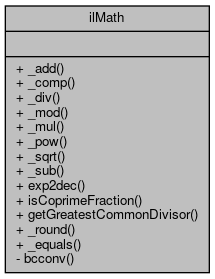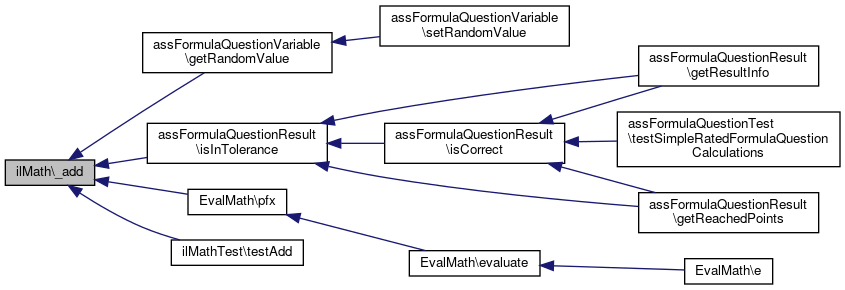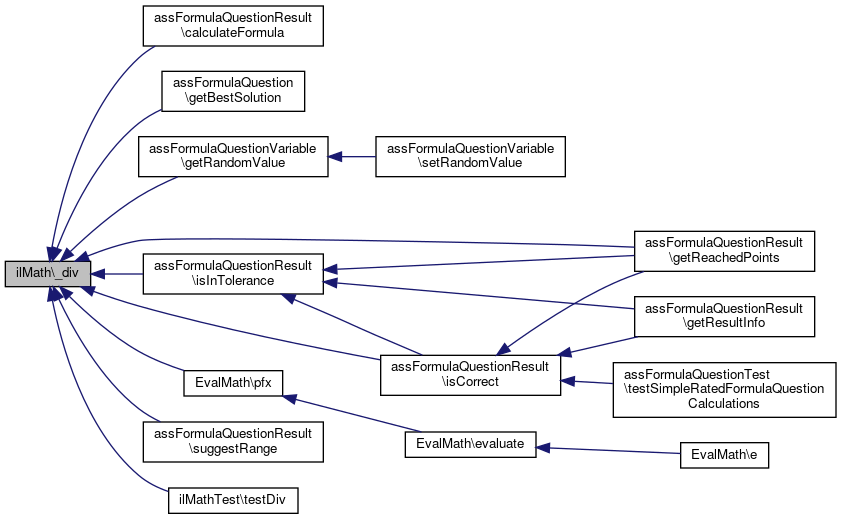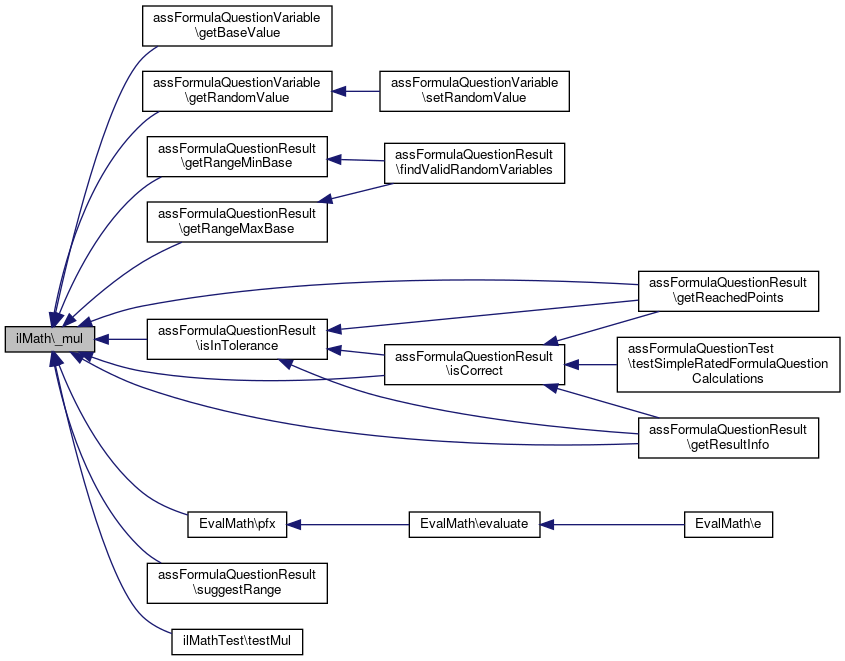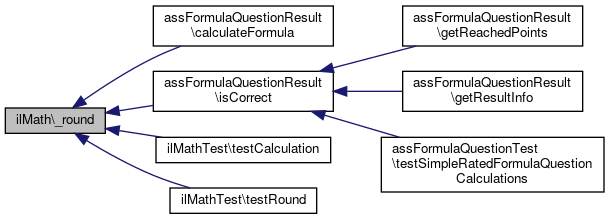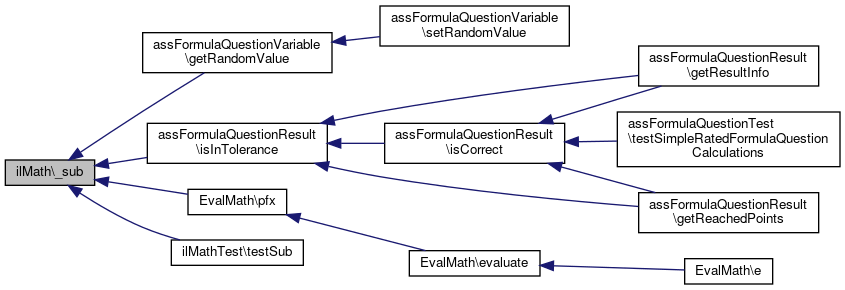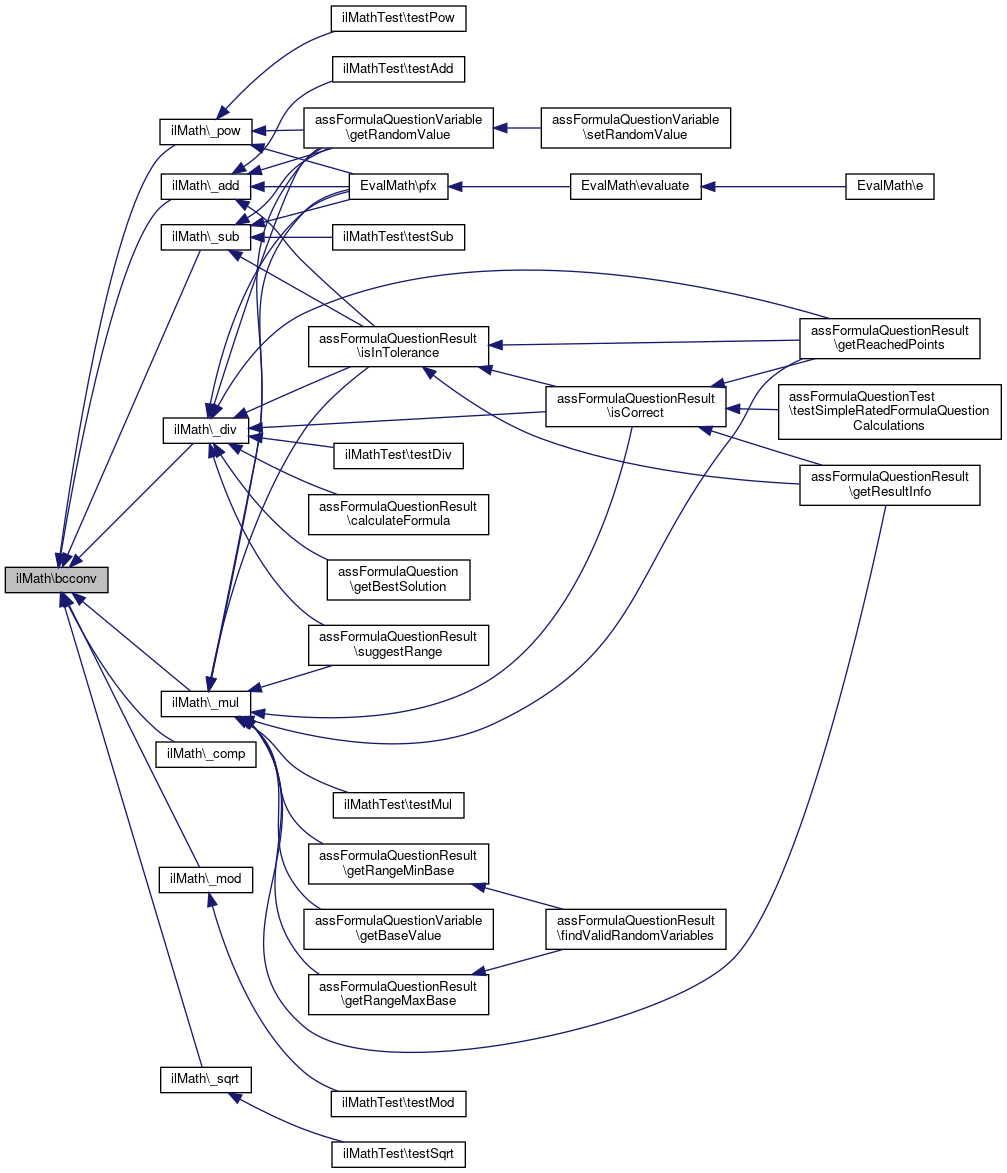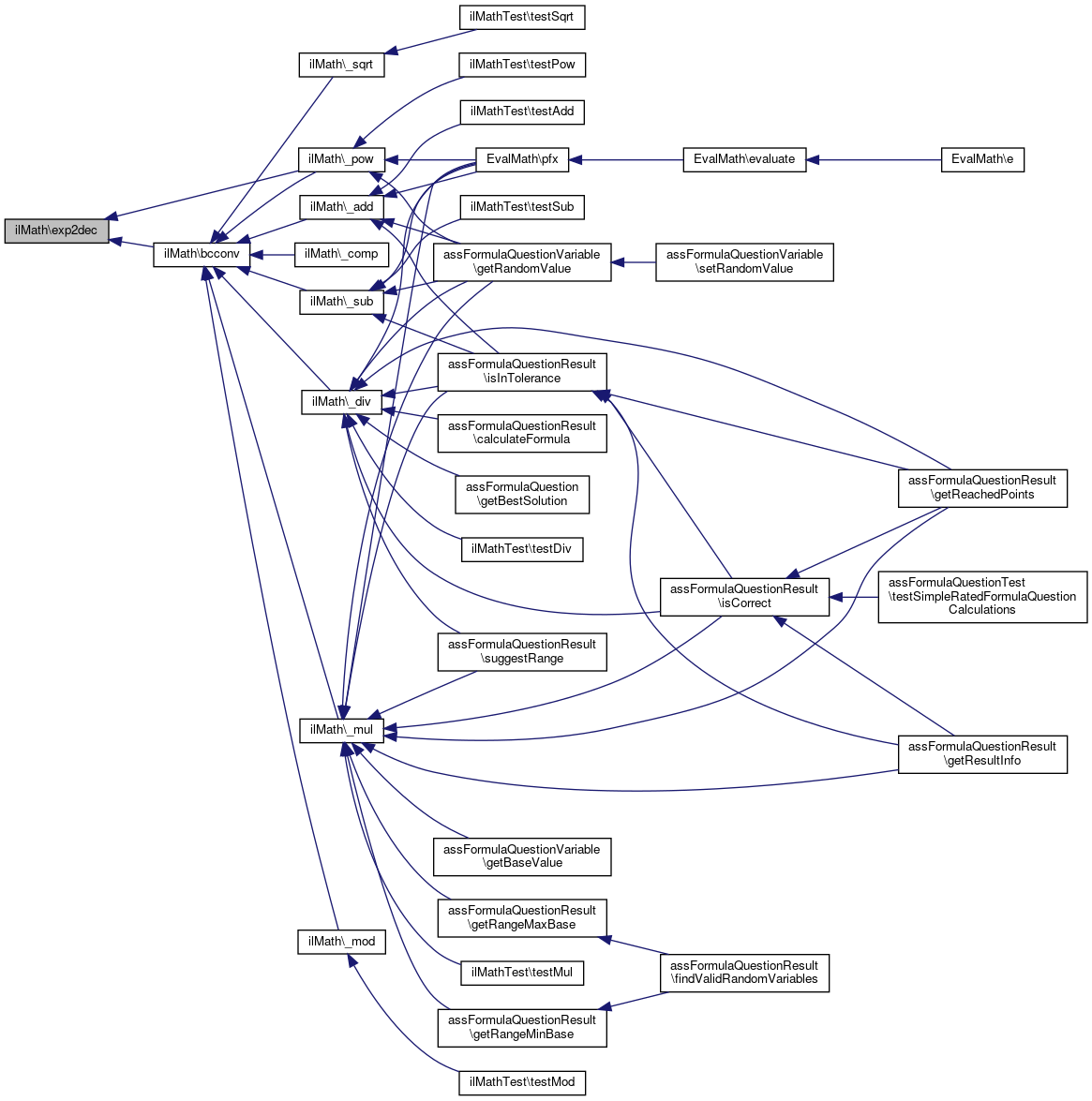 Collaboration diagram for ilMath:
Collaboration diagram for ilMath:Static Public Member Functions | |
| static | _add ($left_operand, $right_operand, $scale=50) |
| static | _comp ($left_operand, $right_operand, $scale=50) |
| static | _div ($left_operand, $right_operand, $scale=50) |
| static | _mod ($left_operand, $modulus) |
| static | _mul ($left_operand, $right_operand, $scale=50) |
| static | _pow ($left_operand, $right_operand, $scale=50) |
| static | _sqrt ($operand, $scale=50) |
| static | _sub ($left_operand, $right_operand, $scale=50) |
| static | exp2dec ($float_str) |
| static | isCoprimeFraction ($numerator, $denominator) |
| static | getGreatestCommonDivisor ($a, $b) |
| static | _round ($value, $precision=0) |
| static | _equals ($value1, $value2, $scale) |
Static Private Member Functions | |
| static | bcconv ($fNumber) |
Detailed Description
Member Function Documentation
◆ _add()
|
static |
Definition at line 37 of file class.ilMath.php.
References $res, and bcconv().
Referenced by assFormulaQuestionVariable\getRandomValue(), assFormulaQuestionResult\isInTolerance(), EvalMath\pfx(), and ilMathTest\testAdd().
 Here is the call graph for this function:
Here is the call graph for this function: Here is the caller graph for this function:
Here is the caller graph for this function:◆ _comp()
|
static |
Definition at line 58 of file class.ilMath.php.
References bcconv().
Referenced by _equals().
 Here is the call graph for this function:
Here is the call graph for this function: Here is the caller graph for this function:
Here is the caller graph for this function:◆ _div()
|
static |
Definition at line 84 of file class.ilMath.php.
References $res, and bcconv().
Referenced by assFormulaQuestionResult\calculateFormula(), assFormulaQuestion\getBestSolution(), assFormulaQuestionVariable\getRandomValue(), assFormulaQuestionResult\getReachedPoints(), assFormulaQuestionResult\isCorrect(), assFormulaQuestionResult\isInTolerance(), EvalMath\pfx(), assFormulaQuestionResult\suggestRange(), and ilMathTest\testDiv().
 Here is the call graph for this function:
Here is the call graph for this function: Here is the caller graph for this function:
Here is the caller graph for this function:◆ _equals()
|
static |
Definition at line 290 of file class.ilMath.php.
References _comp().
Referenced by assFormulaQuestionResult\getReachedPoints(), assFormulaQuestionResult\isCorrect(), and ilMathTest\testEquals().
 Here is the call graph for this function:
Here is the call graph for this function: Here is the caller graph for this function:
Here is the caller graph for this function:◆ _mod()
|
static |
Definition at line 106 of file class.ilMath.php.
References bcconv().
Referenced by ilMathTest\testMod().
 Here is the call graph for this function:
Here is the call graph for this function: Here is the caller graph for this function:
Here is the caller graph for this function:◆ _mul()
|
static |
Definition at line 124 of file class.ilMath.php.
References $res, and bcconv().
Referenced by assFormulaQuestionVariable\getBaseValue(), assFormulaQuestionVariable\getRandomValue(), assFormulaQuestionResult\getRangeMaxBase(), assFormulaQuestionResult\getRangeMinBase(), assFormulaQuestionResult\getReachedPoints(), assFormulaQuestionResult\getResultInfo(), assFormulaQuestionResult\isCorrect(), assFormulaQuestionResult\isInTolerance(), EvalMath\pfx(), assFormulaQuestionResult\suggestRange(), and ilMathTest\testMul().
 Here is the call graph for this function:
Here is the call graph for this function: Here is the caller graph for this function:
Here is the caller graph for this function:◆ _pow()
|
static |
Definition at line 145 of file class.ilMath.php.
References $res, bcconv(), and exp2dec().
Referenced by assFormulaQuestionVariable\getRandomValue(), EvalMath\pfx(), and ilMathTest\testPow().
 Here is the call graph for this function:
Here is the call graph for this function: Here is the caller graph for this function:
Here is the caller graph for this function:◆ _round()
|
static |
Definition at line 285 of file class.ilMath.php.
Referenced by assFormulaQuestionResult\calculateFormula(), assFormulaQuestionResult\isCorrect(), ilMathTest\testCalculation(), and ilMathTest\testRound().
 Here is the caller graph for this function:
Here is the caller graph for this function:◆ _sqrt()
|
static |
Definition at line 176 of file class.ilMath.php.
References $res, and bcconv().
Referenced by ilMathTest\testSqrt().
 Here is the call graph for this function:
Here is the call graph for this function: Here is the caller graph for this function:
Here is the caller graph for this function:◆ _sub()
|
static |
Definition at line 196 of file class.ilMath.php.
References $res, and bcconv().
Referenced by assFormulaQuestionVariable\getRandomValue(), assFormulaQuestionResult\isInTolerance(), EvalMath\pfx(), and ilMathTest\testSub().
 Here is the call graph for this function:
Here is the call graph for this function: Here is the caller graph for this function:
Here is the caller graph for this function:◆ bcconv()
|
staticprivate |
- Parameters
-
$fNumber
- Returns
- string function fixes problem which occur when locale ist set to de_DE for example, because bc* function expecting strings
Definition at line 301 of file class.ilMath.php.
References exp2dec().
Referenced by _add(), _comp(), _div(), _mod(), _mul(), _pow(), _sqrt(), and _sub().
 Here is the call graph for this function:
Here is the call graph for this function: Here is the caller graph for this function:
Here is the caller graph for this function:◆ exp2dec()
|
static |
Definition at line 218 of file class.ilMath.php.
Referenced by _pow(), and bcconv().
 Here is the caller graph for this function:
Here is the caller graph for this function:◆ getGreatestCommonDivisor()
|
static |
Definition at line 273 of file class.ilMath.php.
References getGreatestCommonDivisor().
Referenced by getGreatestCommonDivisor(), isCoprimeFraction(), and ilMathTest\testGcd().
 Here is the call graph for this function:
Here is the call graph for this function: Here is the caller graph for this function:
Here is the caller graph for this function:◆ isCoprimeFraction()
|
static |
Definition at line 266 of file class.ilMath.php.
References getGreatestCommonDivisor().
 Here is the call graph for this function:
Here is the call graph for this function:The documentation for this class was generated from the following file:
- Services/Math/classes/class.ilMath.php
